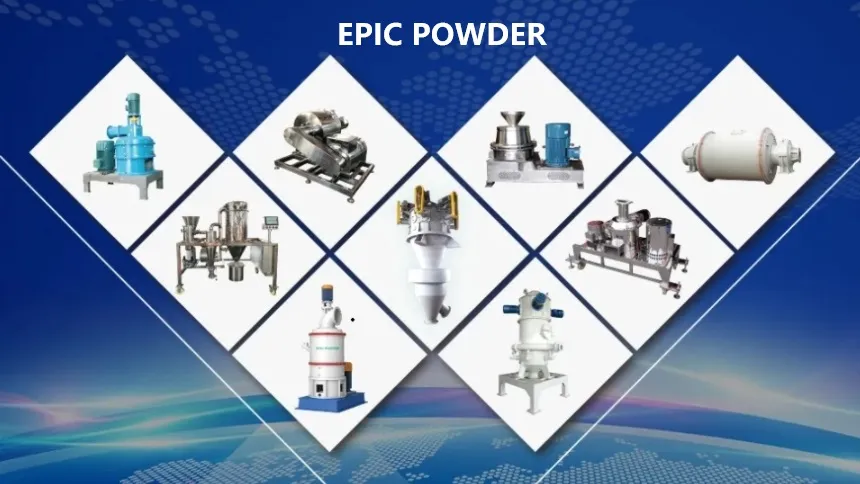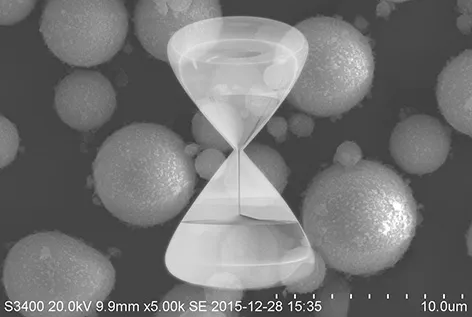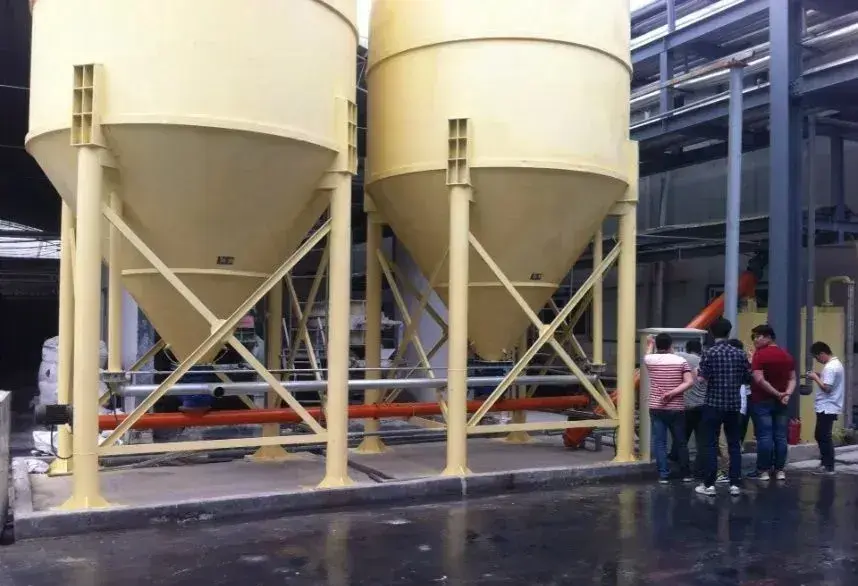What is a Super-Fine Mill?
In the vast system of modern industry, powder processing is a crucial link. The Super-Fine Mill, as the core equipment in powder processing, plays an irreplaceable role. It is like a “magic craftsman” in the industrial field.
It can grind various raw materials into extremely fine powders. These powders are widely used in industries such as chemicals, metallurgy, construction, pharmaceuticals, and food.
They provide essential materials for the development of these industries.
From everyday cosmetics and pharmaceuticals to high-performance materials for construction, and fine components in electronic devices, the Super-Fine Mill is everywhere.
Its importance is self-evident. With rapid technological advancements and growing industrial demand, the Super-Fine Mill continues to evolve, showing superior performance and vast potential.

How it works?
The ability of the Super-Fine Mill to achieve ultrafine grinding lies in its unique working principle. Taking the common airflow-type Super-Fine Mill as an example, it uses high-speed airflow (up to 300-500m/s) or superheated steam (300-400°C).
First, high-pressure air is generated by the air compressor. The high-pressure air is filtered and dried to ensure it is clean and dry before entering the equipment. Material is precisely fed into the grinding chamber by the feeding device.
High-pressure air is accelerated through specially designed nozzles to subsonic or supersonic speeds. Like high-speed bullets, the air carries the material particles in high-speed rotational motion inside the grinding chamber.
During this process, the material particles collide and impact each other, similar to a high-speed car crash. They also experience shear forces from the airflow and impacts with the chamber walls, causing friction.
When the energy from the collisions exceeds the internal energy maintaining the particle structure, the particles are crushed. The crushed material enters the classification zone with the airflow. This zone acts as a strict “screening checkpoint.”
The classifier wheel separates the particles according to size.
Particles meeting the size requirement are separated and sent through a cyclone separator. The cyclone uses centrifugal force to achieve the initial separation of particles from airflow. These particles are then collected through a dust collector, ensuring clean gas emissions.
The fine particles are collected as finished products.
Coarse particles that do not meet the size requirement are sent back to the grinding chamber for further crushing. This cycle continues until all particles reach the desired fineness.
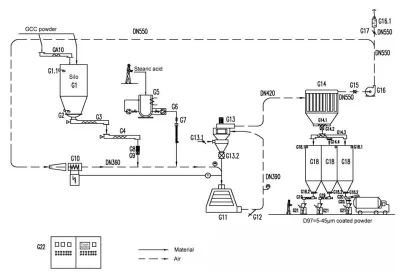
Strong advantages
Ultra-high fineness
One of the most significant advantages of the Super-Fine Mill is its ability to produce extremely fine finished products.
Generally, the finished product fineness can reach several microns or even submicron levels. For example, the airflow-type Super-Fine Mill can grind material to 1-50μm, far surpassing ordinary mills. In the electronic materials field, silicon powder used for chip manufacturing requires extremely fine fineness.
The silicon powder produced by the Super-Fine Mill meets the stringent requirements for particle size uniformity and fineness in chip manufacturing. This ensures the high performance and stability of the chips. Such fine products exhibit better performance in applications.
For example, in the coatings industry, finer pigment powders make the paint color more uniform, delicate, and enhance its coverage.
Save resources
In the production process, the Super-Fine Mill is highly efficient in resource utilization, effectively saving resources. Its grinding components use special materials and designs, offering excellent wear resistance. This greatly extends the service life, reduces replacement frequency, and lowers material loss.
Additionally, due to its high grinding efficiency, the desired fineness can be achieved in a single grinding step. This avoids the energy and time waste caused by repeated grinding in traditional mills.
Wide range of applications
The Super-Fine Mill has a wide range of applications and can handle various materials with different properties. It can process hard ores, such as quartz and corundum, as well as softer materials like plastics and rubber. It can also handle heat-sensitive materials like pharmaceuticals and food ingredients with ease.
In the chemical industry, it can grind various chemical raw materials to the required fineness, meeting the size requirements for chemical reactions. In the food industry, it can process grains, spices, and more into fine powders for various food products. For example, when producing chocolate, the Super-Fine Mill can grind cocoa beans into extremely fine cocoa powder, making the chocolate smoother.
High production efficiency
The design of the Super-Fine Mill enables high production efficiency. Its unique crushing and classification system works in synergy, allowing for continuous production with impressive hourly output.
For example, a large model of Super-Fine Mill can produce several tons per hour when processing calcium carbonate, far surpassing traditional mills.
Additionally, it has a high degree of automation, with operators able to precisely control the operating parameters through an intelligent control system.
This reduces manual intervention and further boosts production efficiency.
In the construction materials industry, when mass-producing powders like cement and lime, the Super-Fine Mill’s high production efficiency fully showcases its advantages, quickly meeting the large demand for building materials in the market.
Multiple application areas
The Super-Fine Mill, with its outstanding performance, has widespread and deep applications in various industries.
chemical industry
In the chemical industry, it is an indispensable device for producing fine chemical products.
For example, when producing high-performance plastic additives, various auxiliaries must be ground into extremely fine powders. This ensures their even dispersion in the plastic matrix, enhancing the plastic’s performance. The Super-Fine Mill can grind additives to submicron levels, meeting this strict requirement.
As a result, the produced plastic products exhibit better strength, toughness, and weather resistance. In coating production, the fineness of pigments directly affects the color, coverage, and stability of the paint. The Super-Fine Mill grinds pigments into ultrafine powders, making the paint color brighter and more uniform.
It also improves the paint’s stability and extends its shelf life.

building materials industry
In the building materials industry, the Super-Fine Mill has wide applications. In cement production, raw materials like clinker and gypsum are superfine ground using the Super-Fine Mill. This improves both the early and late strength of the cement, while reducing cement usage and lowering production costs.
In high-performance concrete production, mineral admixtures such as silica fume and fly ash processed by the Super-Fine Mill can improve the workability, mechanical properties, and durability of the concrete. This makes the concrete stronger and more durable, suitable for large-scale construction projects and infrastructure development.
pharmaceutical industry
In the pharmaceutical industry, the quality and efficacy of drugs are closely related to the particle size of the raw materials.
For some poorly soluble drugs, the Super-Fine Mill grinds the raw materials into ultrafine powders. This increases the specific surface area of the drug, enhancing its dissolution rate and bioavailability. As a result, the drug’s efficacy is improved.

food industry
In the food industry, the Super-Fine Mill makes food tastier and more nutritious.
In chocolate production, it grinds cocoa beans into fine cocoa powder, making the chocolate smoother and creamier.
In seasoning production, it grinds spices into fine powders, making the seasoning flavor richer and more uniform.
In functional food production, it processes ingredients like fiber and probiotics, turning them into fine powders for better absorption, enhancing the health benefits of the food.

electronics industry
In the electronics industry, the Super-Fine Mill is indispensable. In electronic component manufacturing, material fineness and purity are critical.
For example, in chip production, high-purity, ultrafine silicon powder is required.
The Super-Fine Mill meets this demand, providing high-quality materials for chip production, ensuring the chip’s high performance and stability. In electronic ceramics production, grinding ceramic materials into ultrafine powders, it improves ceramic density and electrical properties, making it suitable for manufacturing various electronic components, such as capacitors and resistors.
Development Trend
Currently, the Super-Fine Mill is experiencing rapid growth in the global market.
As industries demand higher fineness and quality of powder materials, the demand for Super-Fine Mills continues to rise. In the Asia-Pacific region, the rapid development of emerging economies like China and India
has boosted the prosperity of industries such as chemicals, construction materials, and pharmaceuticals, leading to a particularly high demand for Super-Fine Mills.
EPIC powder continues to invest in Super-Fine Mills, introducing advanced German technology to enhance its production capacity and product quality.
Conclusion
The Super-Fine Mill, as a key device in industrial powder processing, has become an important driving force for the development of various industries due to its unique working principle, significant performance advantages, and wide application fields.
Driven by technological innovation, the Super-Fine Mill will continue to break performance limits, developing towards greater efficiency, intelligence, and environmental friendliness.
Intelligent production will make the operation of the equipment more convenient and precise, improving production efficiency and product quality. The application of energy-saving and environmental protection technologies will reduce the equipment’s energy consumption and environmental impact, meeting the requirements for sustainable development.
At the same time, the Super-Fine Mill will deeply integrate with other advanced technologies, such as nanotechnology and 3D printing, supporting the development and production of new materials, creating more application scenarios and business opportunities.
It can be foreseen that the Super-Fine Mill will play an even more crucial role in the future industrial development, providing strong technical support for the innovative progress of various industries, and helping global industry reach a higher level.
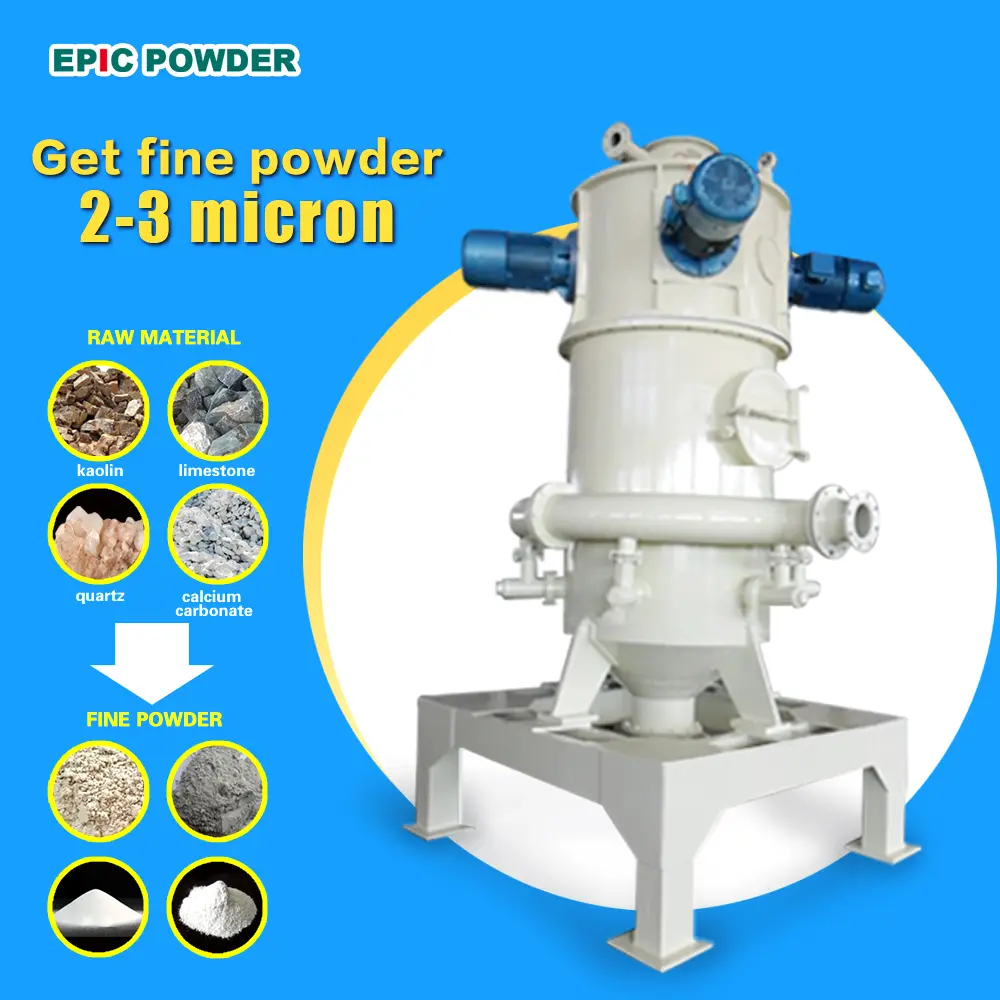
epic powder
Epic Powder,20+ years of work experience in the ultrafine powder industry. Actively promote the future development of ultra-fine powder, focusing on crushing,grinding,classifying and modification process of ultra-fine powder. Contact us for a free consultation and customized solutions! Our expert team is dedicated to providing high-quality products and services to maximize the value of your powder processing. Epic Powder—Your Trusted Powder Processing Expert!
